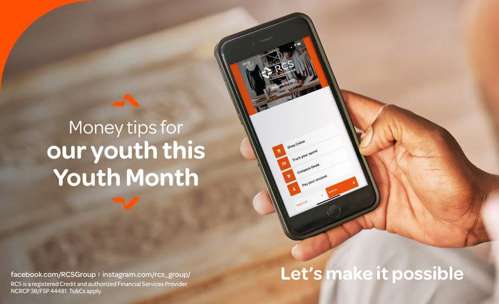Money Tips for Our Youth This Youth Month - June 16
15 AUGUST 2023
As a young person, preparing for your financial wellbeing in the future does not have to be a daunting task once you equip yourself with some basic information. June 16 2022 marks 46 years since the Soweto Youth Uprising. The protest became an expression of South Africa’s quest for democracy and freedom and today South Africa commemorates June 16 as Youth Day, not only as a reminder of young people and their spirit, which often inspires change and evolution, but also for reflecting on the country’s ever-expanding imagination of liberation and inclusion.
June 16 2022 marks 46 years since the Soweto Youth Uprising. The protest became an expression of South Africa’s quest for democracy and freedom and today South Africa commemorates June 16 as Youth Day, not only as a reminder of young people and their spirit, which often inspires change and evolution, but also for reflecting on the country’s ever-expanding imagination of liberation and inclusion.
As a young person in South Africa in 2022 you have experienced Covid19 and its consequences which may have prompted a need for financial literacy and freedom in your life. But, how might you begin to formulate a financial plan that will serve you meaningfully as you grow older? We may have some beginning steps for you to think about and even get you started as soon as today.
How does tax actually work?
South Africa makes use of a residence-based taxation system. This means if you are a South African resident, you are taxed on worldwide income and if you aren’t a South African resident, you are taxed on South African-sourced income. The government receives taxes from individuals (personal tax), businesses (corporate tax) as well as indirect taxes such as VAT. As someone who earns money, it is important to know what the tax rate is on your income so you know what that means for your net income and your financial obligations. Usually, companies deduct tax from your salary monthly but if you are a freelancer, doing your own taxes as opposed to outsourcing help may also save you some money.
You are liable to pay taxes in South Africa if you:
- Are a permanent resident of South Africa (possess South African citizenship)
- Hold a South African residence permit
- Have resided in South Africa for more than 91 days in each of the last five tax years and at least 915 days in total across those five years
- Are a homeowner, liable to pay capital gains tax on property
- Earn more than R1.25 million in foreign employment income as a tax resident
- For the 2023 year of assessment (1 March 2022 – 28 February 2023) earn more than R91 250 per year if you are younger than 65 years.
Of course there are exceptions to the rules, for instance, if you are an elderly person and/or make less than a specific amount yearly. If you do qualify you must register as a taxpayer at a SARS branch.
How to draw up a budget that is simple and easy to keep to
Drawing up a budget is a good way to stay out of financial trouble in your youth. It’s usually a good first step to help you organise and manage your money. Getting an idea of how much you take home and how much of that is allocated to specific expenses can help you get a grip on your coins. Here’s how you can get started.
Step 1: Calculate your net income
Your net income is the amount of money you take home after deductions such as retirement plans, UIF, taxes and medical aid.
Step 2: Track your spending
Once you have calculated your total wages you can begin identifying how much is going to your direct expenses. This helps you see what you are spending your money on and where it may be best to reduce spending and save.
Step 3: Set realistic goals for yourself
In this step you identify your short and long-term financial goals and you do this before you work on the expenses you have tracked. An example of a short-term goal is setting up an emergency fund. A long-term goal can be saving for retirement or your child’s education, which may take years to accomplish.
Step 4: Make a plan
As you have identified the financial goals you now want to adjust your budget to help you meet your goals. Your list of expenses will give you an idea of what you will spend monthly and you weigh this against your net income and priorities. You now have to set realistic and specific spending limits for each category of expenses.
Step 5: Adjust your spending to stay on budget
This step requires you to look at your budget closely and see if there are any other expenses you can live without - with your goals in mind. Look at alternatives for car insurance, medical aid and cell phone subscriptions for example.
Step 6: Review your budget regularly
Keeping a budget is a long-term practice, one you are sure to get better at. As your situation changes, always review your budget. Use your budget as a tool to reflect your lifestyle and how you want to constantly improve it.
Start your savings plan - for real
Having an emergency fund, often referred to as ‘paying yourself first’ is a great way to improve your financial wellbeing. You can use the funds later to supplement your overall retirement plan or even a down payment on a home in the long run. A high-yield savings account or a money market account are two different savings accounts you can open to start your emergency fund - but always make sure you are able to access your funds in case of an emergency. Contributing towards your retirement while you are young is beneficial because you earn interest or compound interest over time. This means that starting your retirement fund even five years earlier can result in a significantly improved end result.
Manage your money, don’t let it manage you
Managing your money requires a great deal of discipline because you have to be willing to let go of instant gratification. Because you have outlined a financial plan that works for you, it becomes easier to stick to your budget and saving practices rather than spending money at the behest of a passing whim. As you begin to grow in your financial journey, you feel empowered because you have developed a plan that helps you take charge of your money and, although you may not be able to spend your savings right away, the relief you will feel once you have retired will be priceless.
MORE ARTICLES ABOUT
RELATED ARTICLES

Financial Wellness
01 FEBRUARY 2024
It’s the Year of Twenty-Twenty-More with the Game mystore Card

Financial Wellness
01 FEBRUARY 2024
Financial Strategies to Consider to Overcome 2024’s Big Hurdles

Financial Wellness
01 FEBRUARY 2024
